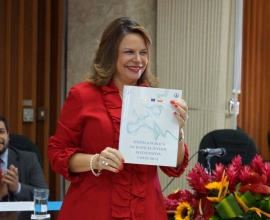Presentation of the Public Policy on Restorative Juvenile Justice of Costa Rica and production of the operational guide for its implementation
On the 30th of September, 2015, the Ministry of Justice and Peace and the Judiciary of Costa Rica officially presented the Public Policy on Restorative Juvenile Justice in the Supreme Court of Justice
The policy is an outcome of the EUROsociAL II programme, financed by the European Union, which encourages the exchange of experiences and good practices between Europe and Latin America with regards to public policies. The International Juvenile Justice Observatory (IJJO) is an operational partner of this project and is a co-author of this policy document, which was created with the participation of various Costa Rican institutions.
Since the end of 2014, EUROsociAL has been providing technical assistance to the Costa Rican Judiciary and Ministry of Justice and Peace in order to draft and implement a national policy on Restorative Juvenile Justice. The pro-active nature and political willingness of these institutions has allowed the project to progress very efficiently.
The product of this cooperation is the new Public Policy on Restorative Juvenile Justice. The official presentation of the policy was attended by Costa Rica’s Vice President, Ana Helena Chacón, the Deputy Minister of Justice, Marco Feoli, the Deputy Minister of Peace, Víctor Barrantes, and Magistrate of the Supreme Court Doris Arias Madrigal, as well as other representatives from the Ministry and the Judiciary, as well as the expert consultant from the EUROsociAL, Osvaldo Vázquez. The formal ceremony included the symbolic presentation of the policy to José Manuel Arroyo, the President-in-Office of the Supreme Court of Justice, and Ana Helena Chacón, who highlighted the importance of “putting these public policies in place to provide opportunities for young people and avoid making the error of criminalisation”.
The document is a comprehensive and inter-sectoral policy tool which puts an emphasis on prevention processes and ways of resolving criminal disputes, respecting the guarantees and regulations of the juvenile justice system in Costa Rica, incorporating the four principles of restorative justice: mediation, reparation, reintegration and participation. The policy also includes the consolidation of alternative forms of social conflict resolution, as well as attention to the needs of those in detention.
As Doris Arias Madrigal, Magistrate of the third chamber of the Supreme Court, explained, “The policy which we are presenting is aimed at adolescents between the ages of 12 and 18 which come into conflict with the Juvenile Criminal Justice Act, and aims to bring together the different judicial, governmental and civil proceedings, guaranteeing their rights so that they can fulfil their responsibilities”.
With regard to the implementation and continuation of this policy, the EUROsociAL expert Osvaldo Vázquez met throughout the week with professionals from the field of juvenile justice, as a preliminary step in the creation of a “Methodological Guide for the Application of Restorative Practices in Custodial and Non-Custodial Sentences in the System of Criminal Responsibility in Costa Rica”, which was also produced as part of the EUROsociAL II Programme.
To achieve this, working meetings were held in the Ministry of Justice and Peace, the offices of the Judiciary and finally in the Latin American Institute of the United Nations for the Prevention of Crime and the Treatment of Offenders (Instituto Latinoamericano de Naciones Unidas para la Prevención del Delito y el Tratamiento del Delincuente or ILANUD). Following these, in order to learn in detail the most practical aspects of the issue, Mr. Vázquez visited the Centre for Young Adults in San José and the juvenile detention centre “Zurquí”. These meetings and visits gave a solid base to the guide on the application of the Public Policy on Restorative Juvenile Justice.
Significant transformations are taking place in Costa Rica’s juvenile justice system, which continues to incorporate more and more elements of Restorative Justice. The commitment to the Public Policy of Restorative Juvenile Justice shows the willingness to create a more sustainable justice system, working within all aspects of the justice process, from the prevention of violence to the reintegration of those who have been released
OIJJ

